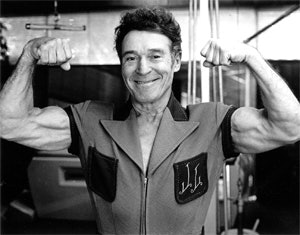Successful programs and successful program managers are everywhere you look these days, but the qualities that make true leaders are in shorter supply.

Leaders are something else entirely. Leaders lead - they are by definition people who other people follow. Because of this, their personal statistics often don't tell the whole story. They are good at what they do, certainly, but their successes tend to be remembered in relation to the success of the group they lead.
Stars can be leaders, and vice versa. But putting your finger on what it is, exactly, that makes a leader special is a lot harder than defining a star. A star hits .300 every year, or leads the team in shooting percentage. A leader might be better known for hitting behind the runner, or for dishing out the most assists. But a leader will almost always have a certain quality that draws people to him or her, makes them want to or even able to achieve greater things as a group.
You know who they are - but what makes them who they are?
Outside Chances It would be wrong to suggest that leaders attain their lofty status wholly because of their own particular strengths. People's careers sometimes rise or fall based on the whims of their superiors, good or bad timing, or good or bad mentoring. In addition, the Peter Principle - "In a hierarchy, every employee tends to rise to his level of incompetence" - is as valid now as it was when Laurence Peter coined the term back in 1969.
Neither can one discount the element of luck, even if luck (as Branch Rickey famously put it) "is the residue of design." Motivational speakers often remind their audiences that the very first step in being all that you can be is to come in to work on time, on the theory that the first person at his or her desk is most ready to focus on the task at hand. The other facet of the timeliness theory was summed up by Woody Allen: "Eighty percent of success is showing up." To be the person on whom luck will be bestowed, you have to first get out of bed.
Diane Dahlmann, director of recreation services and facilities at the University of Missouri, is a longtime leader in college recreation who is most recently reaping praise for her facility-development abilities (see June, p. 158). But beyond being good at what she does, she's no stranger to good fortune. Dahlmann recalls how, 20 years ago, she got her start in facility development when the president of Illinois State University handed her three quarters of a million dollars.
"It was a carrot thrown into a student referendum back in the '80s for the building of a basketball arena," Dahlmann says. "The president had said that if the students voted to fund the arena, the school would give them $750,000 to put toward recreation. When I got to campus in 1985, a year after the vote, they were discussing putting the money toward finishing up the basement of the arena. But it was a nightmare space, with low ceilings and pillars, and you could only get into the building when there was a practice or game going on. I said, `This doesn't make sense.' So instead, we took an abandoned 37,000-square-foot ice rink, remodeled it and leased it for recreation. There weren't 50 of anything in there, but we were able to hothouse a number of ideas and approach it as a club, and it was terrifically successful. They gave me a local architect, and I did the floor plan."
This sort of situation - "Quick, do something with this money!" is the way Dahlmann describes it - is not something that most people get to experience. But Jody Stowers, director of Westerville (Ohio) Parks and Recreation, says the moral of the story isn't that some people are lucky, but that some people seize such moments, while others watch luck pass right on by.
"There's always going to be luck; you have to be in the right place at the right time," Stowers says. "But when opportunities knock at your door, you have to open the door and take them on. Strong leadership stems from what you do with the opportunities that are presented to you. Do you run from them, do you embrace them, do you build on them, do you learn from them?"
Leadership DNA Born leaders? It's doubtful. People are no more born leaders than they are born to run. But certain personality traits - courage, focus, conviction - aren't so easy to teach, or learn.
For example, assuming you enjoy working in the field of athletics, recreation and fitness, it is probably easy to be interested in it. Enthusiasm, a few steps above interest on the ladder of zeal, might be a little tougher for some people to muster. And passion - well, either you have it or you don't.
Unfortunately, many more people claim to be passionate about their jobs than actually are. Having passion is one of the biggest clichés of the self-help business; even the way people say, "I'm passionate," bugs Dahlmann. "Oh my God, I'm glad you're passionate, but right now you're putting me to sleep," she says.
Passion has two components, both of which are essential to leadership. Health club operator (first), consultant (next) and guru (always) Rick Caro of New York-based Management Vision Inc. credits inward-focused passion for his success in the field. "You have to have interest in the areas you're going to focus on," he says, "a passion for wanting to delve in and learn more about it, and continue to learn, learn, learn."
Wayne Welton, athletic director at Chelsea (Mich.) High School, embraces passion's outward effects. "You love the job," Welton replies when asked what defines a leader of young sports participants. "When something is important to you, usually the kids will jump right on board and be as excited as you are."
Dahlmann's take is more expansive. "Leaders have a relentless quality that even exceeds passion," she says. "You need to pursue with gusto things that are important. I think people who call that passion are misusing the word. It's a tireless commitment, a constancy in pursuing excellence."
Another strand in the leadership DNA involves the very essence of character - a person's integrity. Says Robert Kanaby, executive director of the National Federation of State High School Associations and a former school administrator and coach, "I think very much about the importance of honesty and integrity in individuals who are child-centered. Leaders in high school athletics are concerned about everybody and their participation, as opposed to simply developing powerful teams."
The same is true in the college realm, says Dave Hart, athletic director at Florida State University. "Core values are the common thread," he says. "Though it might sound trite, I think it's critically important that that's where your priorities are as you're leading. You're not only leading young men and women on the field, you're leading your staff and all those stakeholders and constituencies who are really counting on you to be a person who has core values and will do things the right way, and will always put the university's best interests first."
"Obviously, we want people of high character and moral standing working with kids, and we make that a high priority," adds Welton. "I think we look for great people first and foremost; their coaching experience and skills will follow."
A "great person" is certainly something we would all strive to be, but like another trait considered essential to leadership - charisma - it isn't exactly teachable.
"Charismatic people, individuals who attract kids to them - well, it's pretty easy to see when you have one," Welton says. "Kids will run through the proverbial wall for them. It sounds corny, but it's really true."
Talking the Talk Standards of leadership change; imagine how some of Vince Lombardi's dictums would be perceived in today's inclusive, everybody-plays environment. Changes in the field equal changes in the public's expectations of program administrators, and the field has undergone rapid change in virtually all facets. Leaders across the board say that communication has never been more important in their jobs, regardless of with whom they're communicating.
Jack Roberts, executive director of the Michigan High School Athletic Association, lists communication second only to integrity in leadership importance.
"Assuming you have the baseline of knowledge in a job, communication determines who is successful and who is not," Roberts says. "That's true at every level, and with regard to everything from writing staff manuals to speaking to parents. How well do you communicate in a way that people buy in to your program, so that they are motivated to move in the same direction?"
In certain areas of program administration, the particular culture dictates what aspects of communication will be most important. In high schools and youth programs, as parents have become more concerned about their children's playing time and safety, being able to communicate to parents the goals of the program becomes most vital. In universities, the preoccupation with fund-raising may be paramount, but the prescription is the same: communication with boosters and other business leaders to ensure the program meets all NCAA guidelines. In the for-profit realm, communicating with customers is as important in fitness as it is in any other business where you offer a service in return for a person's hard-earned dollars, and in both public and military recreation you must always be able to justify to the holders of the purse strings why your program is beneficial to the community at large.
"We need to be prepared to defend everything we do," says Van Stokes, recreation director at Ft. Campbell, Ky. "The essence of recreation is universal, but the military culture has many systems that impact recreation, including transportation, finance, budgeting, property, not to mention the military structure of communication. So the military recreation professional has to understand that culture, and be able to communicate to our customer - military personnel, civilian families and commanding officers - how we are good stewards of the resources that the public has helped provide."
Key among communication skills, offers Fran Mainella, director of the National Park Service, is listening. This is particularly important as a complement to persuasive speaking. "In a time of limited funding, the only way to go forward is through partnerships, working with others," Mainella says.
"It comes back to having passion, actually," says Michelle Park, executive director of the Ohio Parks and Recreation Association (OPRA). "To build support, you have to strategically think about what partner can help you achieve your goals. Hopefully, you can engage people through your leadership and enthusiasm, by explaining the value that the park and recreation agency brings by providing something beneficial to the citizens of the community. Communicating that sometimes takes a great deal of expertise."

"Leadership in campus recreation has changed over the past 10 years, because campus recreation has changed; it isn't just intramurals anymore," notes Mike Edwards, director of campus recreation at Georgia Tech University. "Something in the neighborhood of $14 billion worth of new facilities have gone up on university campuses, and when people start investing those kinds of dollars, they want to know, `Where's the return on my investment?' It's no longer the case where you can throw some balls out onto the gymnasium floor and everybody will be happy."
Certain management abilities that leaders have are easy to understand: The ability to plan, to set goals, to take risks. However, "vision" - which for most business consultants and self-help gurus is the umbrella term for such skills - is a concept that is far more difficult to define.
Asked to list the primary characteristics of leadership, acknowledged leaders in the field repeatedly mention vision. For some, it is best described with another worn phrase - the ability to see "the big picture" or "beyond one's desk." Roberts says a leader is someone "who can see beyond the mundane, who can see the big problems in the midst of all the little problems, keep the mission in mind even when it's a quagmire of details and controversy." Similarly, Stokes makes reference to the ability "to take a big step back from taking care of time cards, supply inventories and fire extinguishers; lighting ball fields; and making sure the fitness equipment is maintained to remind ourselves every day why we come to work."
Deborah Yow, athletic director at the University of Maryland, names vision as the single most important attribute of a leader, and defines it as "one's ability to project outcomes under certain scenarios, and the willingness to plan for those possibilities." While conceding that it "sounds pretty abstract," Yow believes that it is a skill common to leaders - and that it can be learned.
"Part of it is your formal education and your propensity for the work, and part of it is your ability to learn very quickly, to not repeat the same mistakes or make applications from one mistake to another set of circumstances between which others don't even see a connection," Yow says. "There are people who have a propensity for being right in preparation, and they enjoy positive outcomes more often. It's not just guessing; many people make mistakes and never learn from them."
"Vision is a rare commodity; it's a gift," says FSU's Hart. "People with vision have the ability to stay focused, and most important, they have the ability to always be looking to tomorrow. Being able to anticipate problems totally changes the environment in which you work."
Management Vision's Caro attributes the success of the International Health, Racquet & Sportsclub Association, which he helped found, to the visionary leadership of its longtime executive director, John McCarthy. But smaller organizations succeed or fail based on their administrators' ability to see or not see the future clearly, too.
"It's a real talent to be able to read trends and then respond to them, and provide the proper product to meet the needs of a particular audience," Caro says. "But of course, though it's good to have an idea, you also have to execute it well."
Department of Energy Kanaby says ferreting out the field's true leaders is as easy as seeing who's burning the midnight oil. "We can't believe the time our best people put into their programs," he says. "We call them 7-11 people - they get there at seven in the morning, and if they have an activity that evening they're still there at 11 at night."
Boundless energy, boundless enthusiasm, boundless vision. Leaders have all that, and something else - the people who work for them and with them, helping put their ideas into action.
OPRA's Park both lives and works in Westerville, and she says she has watched with wonder as the city's parks and recreation department has been transformed under Jody Stowers. First came a master plan for the entire parks system, then a successful funding initiative, and on and on, each step building on the next. In 10 years' time, the system's parkland doubled, new facilities were built and older ones rehabilitated. Then the accolades started coming. In 1992, Stowers was the first recipient of the National Recreation and Park Association's Robert W. Crawford Young Professional Award. Two years later, she won the NRPA American Park and Recreation Society President's Award. Three years after that, she won the OPRA Professional of the Year Leadership Award. And in 2001, in what she considers the most important achievement of her career, her Westerville department won the National Gold Medal Award for excellence in park and recreation administration.
According to Stowers, leadership starts with "setting high standards for yourself." "You have to set your own bar high," she says. "Without that, it's very hard to get the buy-in you need from the folks who make you what you are as the leader."
But even lofty goals must be rooted in reality. To achieve group success - not merely individual success - one must always acknowledge one's own limitations. "I have always liked to understand where I'm weak so I can surround myself with people who are strong in my areas of weakness," Stowers adds. "You surround yourself with the best people you can find, and you hope to give them what they need to succeed. Because let's face it, I've had a lot of successes in my career, but they're not only mine, they also belong to the people with whom I've surrounded myself. Together we've made it happen."
































